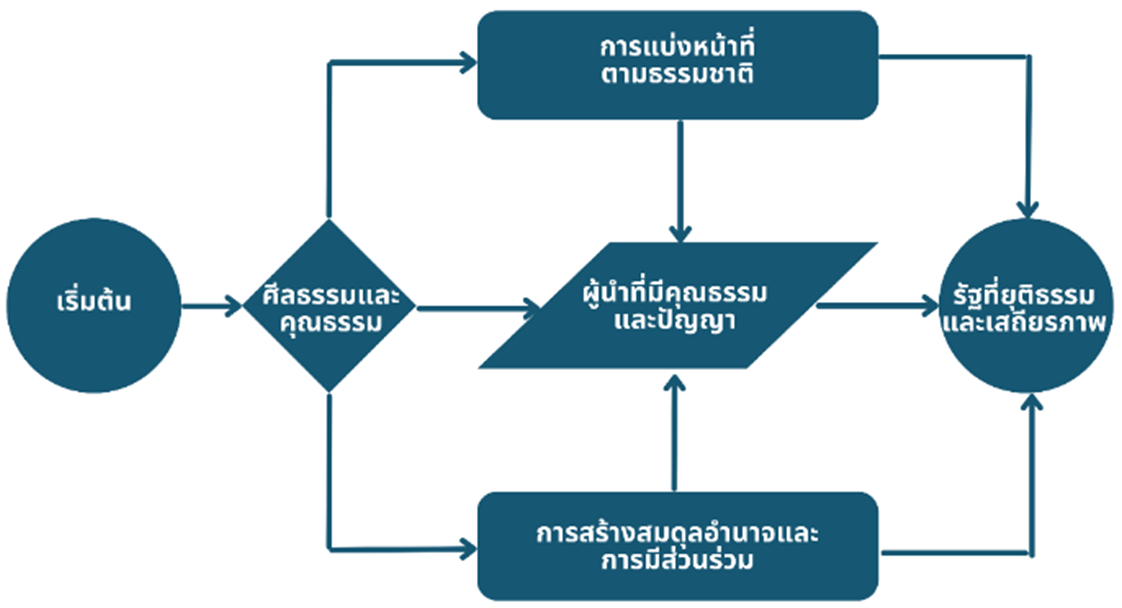MORALITY AND POLITICS: INTEGRATING PHILOSOPHIES OF SOCRATES, PLATO AND ARISTOTLE
Keywords:
Moral, Politic, Philosophy, Ideal StateAbstract
This article aims to examine the relationship between morality and politics through the perspectives of Socrates, Plato, and Aristotle, emphasizing that a leader's virtue and justice in society are fundamental to a stable state. Socrates believed that a good leader must possess virtue and wisdom, utilizing a process of inquiry and exchange (Socratic Method) to seek truth and cultivate moral consciousness. Plato expanded this idea to the structure of the state, proposing an ideal state where rulers, warriors, and producers have clearly defined roles to maintain social balance. Aristotle adapted these ideas to practical governance by advocating for a Mixed Government, integrating democracy and aristocracy to prevent abuse of power and ensure fairness in governance. This study highlights that morality, and politics must coexist for effective governance. Leaders with integrity, a balanced political structure, and a fair distribution of power contribute to the stability of the state and the well-being of its citizens. The philosophies of these thinkers remain relevant today, offering valuable insights into establishing a just and sustainable political system.
References
ไกอุส. (2566). ‘การธำรงรักษารัฐ’ ด้วยการไม่ละเมิดกฎหมาย และการสำนึกในบุญคุณของประเทศในสังคมกรีกโบราณ. สืบค้น 3 มกราคม 2568, จาก https://shorturl.asia/SxwIT
พระครูเกษมวัชรดิตถ์ (เกษม ฐิติสมฺปนฺโน). (2566). การบูรณาการหลักพุทธธรรมเพื่อเสริมสร้างการตัดสินใจไปเลือกตั้งสมาชิกสภาและนายกองค์การบริหารส่วนตำบลของประชาชนในจังหวัดลำปาง. วารสารพุทธนวัตกรรมและการจัดการ, 7(6), 200-211.
พระประเสริฐ เตชโก. (2564). ปรัชญาการเมืองยุคคลาสสิก. วารสาร มจร สังคมศาสตร์ปริทรรศน์, 10(2), 364-372.
บ้านจอมยุทธิ์. (มปป.). ปรัชญาการเมือง. สืบค้น 7 มกราคม 2568, จาก https://shorturl.asia/5jmu0
Acemoglu, D., & Robinson, J. A. (2013). Why nations fail: The origins of power, prosperity, and poverty. London: Profile Books.
Annas, J. (1999). Platonic Ethics, Old and New. New York: Cornell University Press.
Aristotle. (1998). Politics (C. D. C. Reeve, Trans.). Indianapolis: Hackett Publishing.
Keyt, D. (1991). Aristotle: Politics Books V and VI. England: Clarendon Press.
Kraut, R. (1984). Socrates and the State. New Jersey: Princeton University Press.
Miller, F. D. (1995). Nature, Justice, and Rights in Aristotle's Politics. New York: Oxford University Press.
Plato. (2003). The Republic (C. D. C. Reeve, Trans.). Indianapolis: Hackett Publishing.
Reeve, C. D. C. (2000). Action, Contemplation, and Happiness: An Essay on Aristotle. USA: Harvard University Press.
Transparency International. (2024). Corruption perceptions index 2023. Retrieved December 12, 2024, from https://shorturl.asia/OIGc1
Vlastos, G. (1991). Socrates: Ironist and Moral Philosopher. UK: Cambridge University Press.

Downloads
Published
How to Cite
Issue
Section
Categories
License
Copyright (c) 2025 Academic Journal of Political Science and Public Administration

This work is licensed under a Creative Commons Attribution-NonCommercial-NoDerivatives 4.0 International License.




